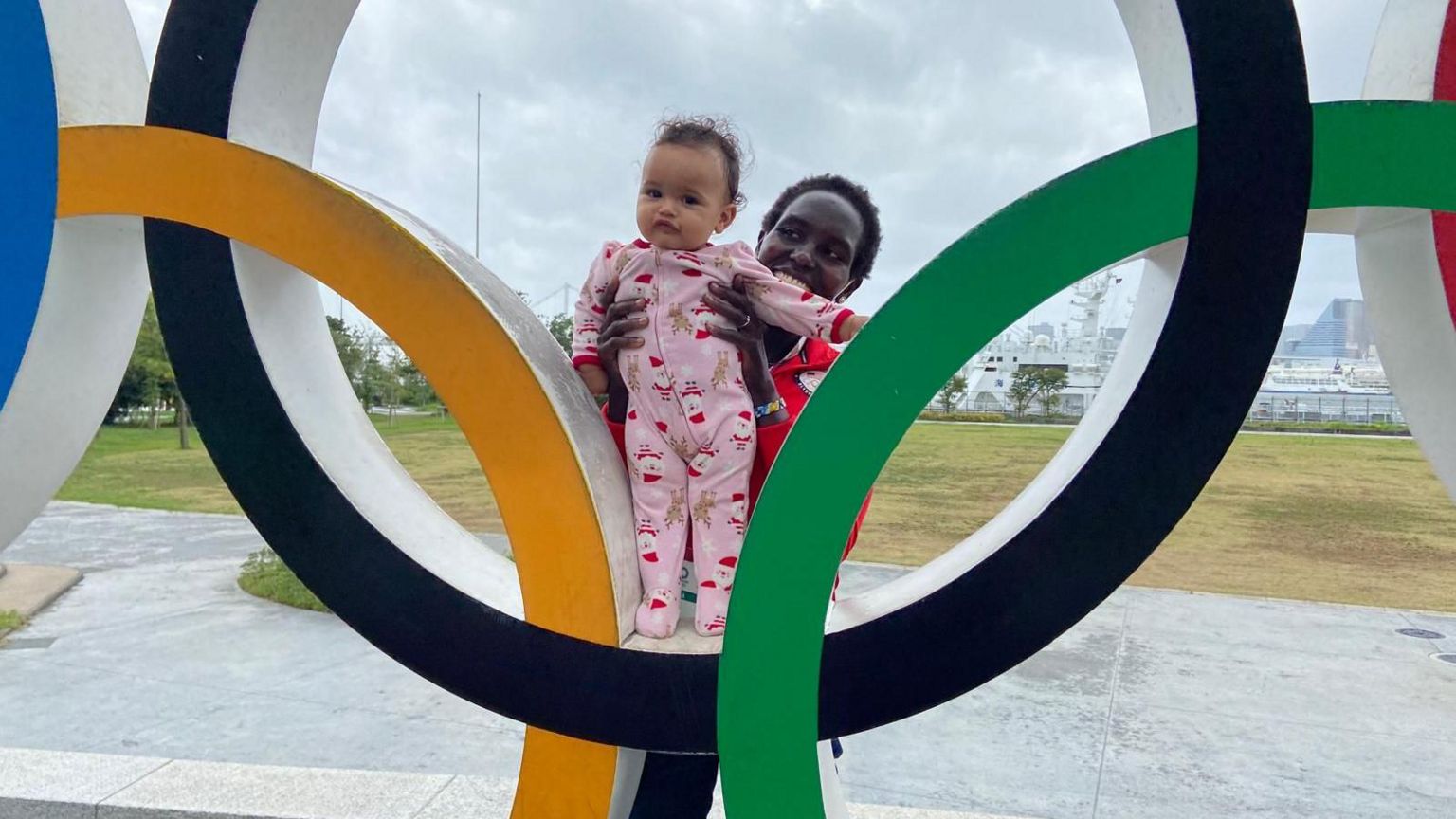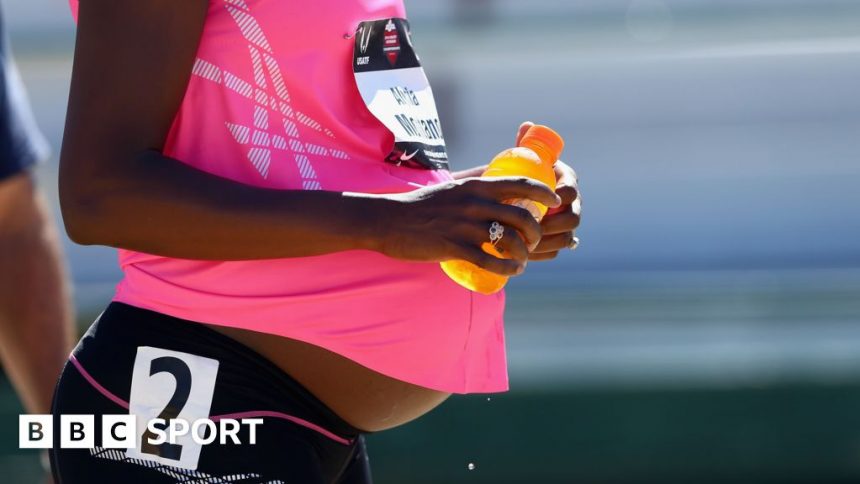The breastfeeding athletes driving Olympic change

Marathon runner Aliphine Tuliamuk was not allowed to have daughter Zoe stay with her in the athletes’ village at Tokyo 2020
-
Published
“I cried a lot on the bus ride to the Olympic village. I was just watching videos of my baby and looking at her pictures. Then I got there, and I just couldn’t sleep without her.”
When marathon runner Aliphine Tuliamuk headed off to the Tokyo Olympics in 2021, one thing was clear: she was not going to travel without her six-month-old daughter Zoe.
The unique set-up of the Games came in the midst of the Covid-19 pandemic, with the marathon held in the northern Japanese city of Sapporo.
It meant Tuliamuk could be with her family – except on a distressing first night when she stayed at the athletes’ village in Tokyo where children were banned.
As a result, she was separated from her baby who she was breastfeeding.
“The first time I ever slept without Zoe was in the village. Zoe and my husband stayed in a hotel. That was really hard,” Tuliamuk told BBC Sport Africa.
“I was so engorged. I was pumping and thinking ‘My baby is not even here with me’ – then I called them and she was crying, losing her mind because she didn’t understand why her mum is not there.”
It is why the Kenya-born American runner welcomes the new provisions for nursing mothers and child carers at Paris 2024, including a dedicated space for children in the athletes’ village.
“I am just so happy that in only four years from when I couldn’t be with my baby, it’s now changed to where they have facilities for them. That is pretty incredible.”
What does Paris 2024 offer nursing mothers and child carers?
The issue of when to stop breastfeeding was one that Tuliamuk, like many sporting mothers, had to wrestle with.
The World Health Organisation and the the United Nations Children’s Fund recommend that children be exclusively breastfed for the first six months of life, external and continue to breastfeed alongside adequate food until they are two or beyond.
“I was going to breastfeed for three or four months which would still give me about two and a half months before the Olympics,” Tuliamuk explained.
“But once my daughter arrived, I realised that stopping breastfeeding was not on the cards for me. It was just something I loved so much.”
Such experiences prompted the International Olympic Committee (IOC) executive board and Paris 2024 to create a dedicated space for children for the first time in Olympic history.
“We’re taking a lot of lessons from Tokyo and the previous Games and we want to constantly improve on the athlete experience,” Emma Terho, chair of the IOC athletes’ commission, told BBC Africa.
“We have more and more athletes that have very young children, and mothers that are continuing their career quite soon after giving birth.
“They can concentrate a lot better on competing if there is a facility that enables them to have a child with a caregiver close by at the Olympic Games.”
So, what can nursing mothers and child carers expect?
The creche offers space and privacy for breastfeeding mothers who will be able to pump and store their milk. There are also nappy changing facilities and play areas.
Overnight accommodation is available outside the village, if National Olympic Committees (NOCs) agree to fund it.
Terho, a former Winter Olympian, says there is a booking system for those who need it most.
“We wanted to make sure there is this space where they [competitors] can be in quiet and privacy, still able to focus on probably the highlight of their career,” she said.
But what about other Olympic areas?
Tuliamuk says the Sapporo marathon site in 2021 was not set up for nursing mums.
After a late change to the start time because of the heat, she was not able to express her milk in the hotel.
“I got to the starting line where we had a tent for Team USA, but there was no place to breastfeed or pump,” the 35-year-old said.
“I would have needed to go to the bathroom and pump, but I just ran out of time.
“It would have been nice if there was a private tent but nobody was thinking there might be athletes who are breastfeeding.”
A strong drive for change
Alysia Montano, who advocates for sporting women, made headlines in 2014 when she ran at the US Nationals at 34 weeks pregnant
Terho says a collaboration between the IOC athletes’ commission and its Paris 2024 equivalent helped get this initiative off the ground, with now-retired 200m Olympic champion, Allyson Felix of the United States, “a driving force”.
French judo star Clarisse Agbegnenou, a two-time Olympic champion, has also advocated for better provisions at her home Olympics, having breast-fed her baby, Athena.
“It hurts me to hear people saying ‘We can do only one thing at a time’, ‘You can’t evolve in your job’ or ‘You can’t be a high-level athlete’ while being a mum”, Agbegnenou told Olympics.com., external
They are not alone in their push for change.
American middle-distance runner Alysia Montano is founder of the group &Mother, set up to advocate for better conditions, contracts and sponsorship. Felix is on the group’s board of directors.
Montano famously ran at the 2014 USA Nationals in Sacramento while eight months pregnant.
“I felt that we haven’t seen what it looks like to be a woman in my career, to visibly see her being pregnant, having her babies and continue her career, so I’m just going to do it,” Montano told BBC Sport Africa.
A few months later, tied to a contract that would see her lose her financial support if she were to take any maternity leave, Montano was forced to tape up her abdomen after giving birth so she could continue training.
Finding ways to continue breastfeeding whilst travelling was also a challenge.
“I won nationals at six and 10 months postpartum,” she explained.
“I won a World Championship gold medal. We broke an American record. I figured out ways to pump my breast milk and pack it up and get it back to my daughter in the States when I would travel.
“And I realised there’s no system that’s actually supporting this. This is why it’s so difficult.”
With her own experiences in mind, plus those of the women she supports, Montano says Paris 2024’s offering is a step in the right direction.
“We have been super loud advocates of what is needed, with our goals of supporting all Olympic athletes, knowing this is a major stage for the entire world to see how it’s done and what the blueprint of success can look like.”
A first in Olympic history – but is this enough?
Tuliamuk hopes breastfeeding mothers at sporting events – including future Olympics – can get the support they need
One of the biggest hurdles for nursing mothers who seek to make use of the overnight accommodation will be to convince their NOCs to fund the cost.
The IOC’s Terho says the organisation are looking at this for future Olympics, but they first need to monitor the take-up in Paris.
For campaigners like Montano, more needs to be done ahead of Los Angeles 2028.
“I’d like to see that stadiums are safe with respectable lactation accommodations on the track, in our warm-up area, having a space with electricity to be able to pump your breast milk and know there is a safe space for you to store it,” Montano said.
“It is still a privilege to afford a nanny or somebody who can be with you for 14 days overseas.
“We’d love to see some of the work we’re doing with national governing bodies to support families during this time.”
Tuliamuk, who missed out on Paris 2024 through injury, is also looking forward to LA 2028, hoping she will have the support she needs if she was to welcome another child by then.
“Having your baby there makes sure that nothing changes and that you can be the best version of you,” she said.
“We’ve seen what mothers can do when they’re 100 % supported. Let’s continue to do that.”





